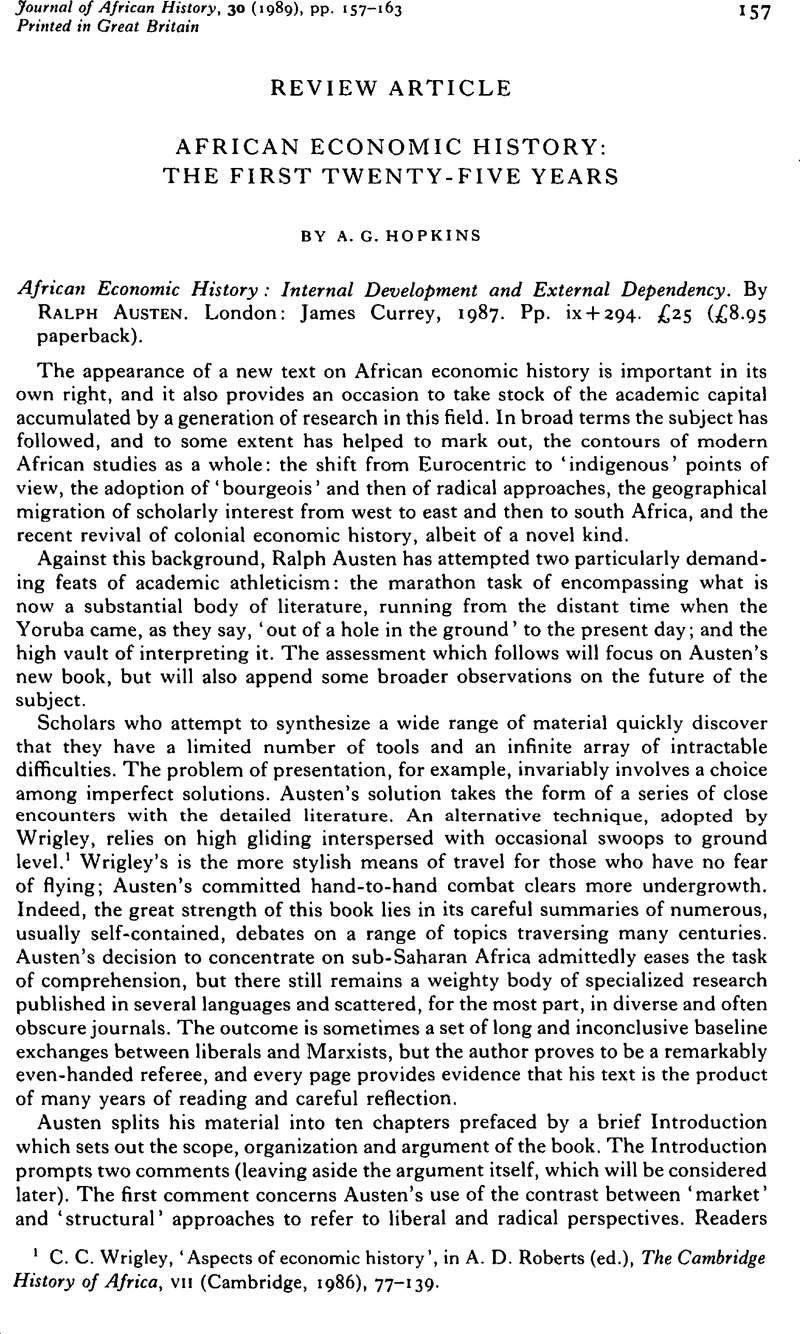Published online by Cambridge University Press: 22 January 2009

1 Wrigley, C. C., ‘Aspects of economic history’, in Roberts, A. D. (ed.), The Cambridge History of Africa, VII (Cambridge, 1986), 77–139.CrossRefGoogle Scholar
2 Austen's categorization is similar to that suggested by the present writer in ‘Africa's age of improvement’, History in Africa, vii (1980), 141–60.Google Scholar A sample of the research undertaken during the 1980s can be found in Hay, Margaret Jean, ‘Recent trends in African economic history’, Dalhousie African Working Papers, no. 4 (1985).Google Scholar
3 Wilks, Ivor, ‘Land, labour, capital and the forest kingdoms of Asante: a model of early change’, in Friedman, J. and Rowlands, M. J. (eds.), The Evolution of Social Systems (London, 1977), 487–534Google Scholar; Vansina, Jan, ‘Towards a history of lost corners in the world’, Economic History Review, xxxv (1982), 165–78.CrossRefGoogle Scholar See also ‘Contributions to a history of agriculture and fishing in Central Africa’, special issue of African Economic History, no. 7 (1979), 1–181.Google Scholar
4 Law, Robin, ‘Royal monopoly and private enterprise in the Atlantic trade: the case of Dahomey’, J. Afr. Hist, xviii (1977), 555–77CrossRefGoogle Scholar; Northrup, David, Trade Without Rulers: Pre-Colonial Economic Development in South-East Nigeria (Oxford, 1978)Google Scholar; Latham, A. J. H., Old Calabar, 1600–1861: The Economic Impact of the West Upon a Traditional Society (Oxford, 1978).Google Scholar
5 On pp. 101–2, for example.
6 Hancock, W. K., Survey of British Commonwealth Affairs, II, pt. 2 (London, 1942).Google Scholar
7 ‘World War I and Africa’, Special issue of the J. Afr. Hist, xix (1978), 1–130Google Scholar; Michel, Marc, L'Appel à l'Afrique: contributions et réactions à l'effort de guerre en A.O.F. (1914–1919) (Paris, 1982)Google Scholar; ‘Francophone Africa and the Depression of the 1930s’, special issue of African Economic History, no. 4 (1977), pp. 103–76Google Scholar; ‘L'Afrique et la crise de 1930’, special issue of the Revue française d'histoire d'outre-mer, lxiii (1976), 375–779Google Scholar; Killingray, David and Rathbone, Richard (eds), Africa and the Second World War (London, 1986)CrossRefGoogle Scholar; UNESCO, Africa and the Second World War (Paris, 1985).Google Scholar
8 A valuable overview of recent economic developments is now available: Wilson, Francis, ‘Southern Africa’, in Crowder, Michael (ed.), The Cambridge History of Africa, viii c. 1940–c. 1975 (Cambridge, 1984), 251–330.Google Scholar
9 Denoon, Donald, Settler Capitalism: The Dynamics of Dependent Development in the Southern Hemisphere (Oxford, 1983).Google Scholar
10 Fieldhouse, D. K., Black Africa, 1945–1980: Economic Decolonisation and Arrested Development (London, 1986).Google Scholar
11 Fieldhouse, , Black Africa, 231–2.Google Scholar
12 Marseille, Jacques, Empire colonial et capitalisme française (Paris, 1984)Google Scholar emphasizes how sectoral changes in the French economy, combined with the increasing costs of maintaining political control in the 1950s, brought about a reappraisal of the means of defending French interests in the colonies.
13 A valuable recent survey is Hargreaves, J. D., Decolonization in Africa (London, 1988)Google Scholar.
14 Wickens, Peter, Africa, 1880–1980: An Economic History (Cape Town: Oxford University Press, 1986)Google Scholar adopts a strictly narrative, chronological approach which offers less to discuss – and less to criticize.
15 For an earlier attempt see Hopkins, A. G., ‘Clio-antics: a horoscope for African economic history’, in Fyfe, Christopher (ed.), African Studies Since 1945: A Tribute to Basil Davidson (London, 1976), 31–48.Google Scholar
16 Hopkins, A. G., ‘From Hayter to Parker: African economic history at Birmingham University, 1964–86’, African Affairs, LXXXVI (1987), 93–102.CrossRefGoogle Scholar
17 One possible approach is sketched in Hopkins, A. G., ‘The World Bank in Africa: a historical perspective’, World Development, xiv (1986), 1473–87.CrossRefGoogle Scholar
18 A final indulgence: Hopkins, A. G., An Economic History of West Africa (London and New York, 4th impression, 1988).Google Scholar